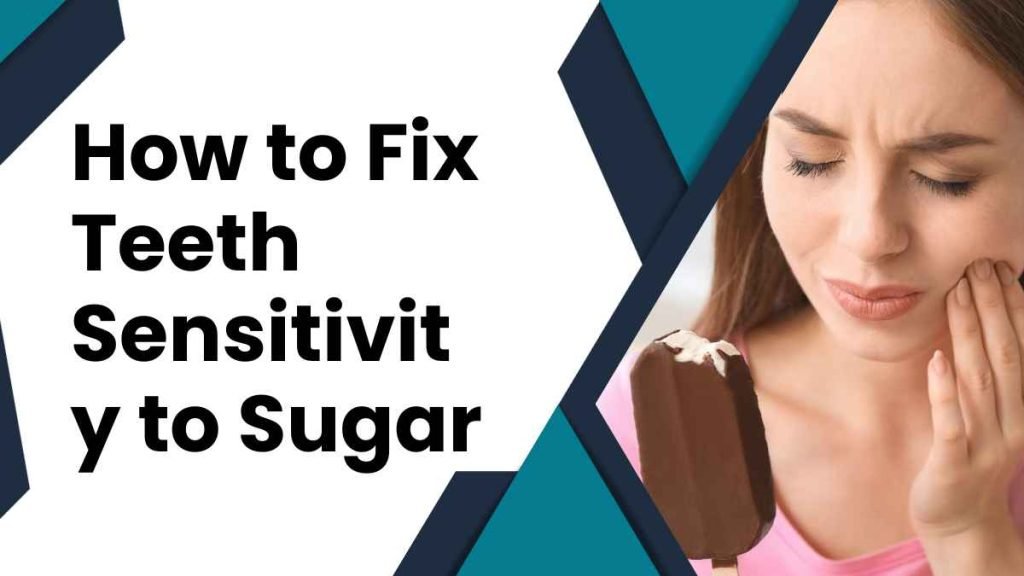How to Fix Teeth Sensitivity to Sugar! Are you tired of wincing in pain every time you indulge in your favorite sweet treats? You’re not alone! Tooth sensitivity to sugar is a common dental woe that plagues many, causing discomfort and ruining the joy of enjoying sugary delights. But fear not, for in this comprehensive guide, we will explore How to Fix Teeth Sensitivity to Sugar. Here we will delve into the depths of tooth sensitivity and unravel the secrets to fix it. So, grab a cup of tea (not too hot, though!) and let’s explore the world of dental well-being together.
Table of Contents
Sweets and Tooth Sensitivity: A Sweet Yet Painful Connection
You know that delightful rush you get when you take a bite of your favorite sugary snack? Unfortunately, for people with sensitive teeth, that rush is often accompanied by a sharp, shooting pain. But why does this happen? Well, it all boils down to the microscopic pores in your teeth, known as dentin tubules. When these tubules are exposed, sugary substances can seep in, triggering nerve endings and causing that uncomfortable sensation.
How to Fix Teeth Sensitivity to Sugar: A Step-by-Step Guide
Here you can check the step-by-step guide about How to Fix Teeth Sensitivity to Sugar:
Total Time: 10 minutes
Choose the Right Toothpaste
Invest in a toothpaste specifically designed for sensitive teeth. These toothpaste variants contain desensitizing agents that help block the tubules, reducing sensitivity over time.
Soft-Bristled Toothbrush is Your Best Friend
Opt for a toothbrush with soft bristles to prevent further enamel wear. Brush gently in circular motions, ensuring you cover all tooth surfaces without being too abrasive.
Fluoride Mouthwash for Protection
Rinse your mouth with a fluoride mouthwash after meals. Fluoride strengthens tooth enamel, acting as a shield against sugar-induced sensitivity.
Dental Sealants for Added Protection
Consider dental sealants, a protective coating applied to the chewing surfaces of molars. Sealants act as a barrier, safeguarding your teeth from sugar and acid attacks.
Avoid Acidic Foods and Drinks
Acidic foods and beverages, like citrus fruits and sodas, can worsen tooth sensitivity. Limit your intake of these items to preserve your dental health.
Regular Dental Check-ups are Non-Negotiable
Schedule regular dental check-ups. Dentists can identify underlying issues, provide professional cleanings, and recommend suitable treatments to alleviate sensitivity.
Causes of Sensitive Teeth: Unraveling the Mystery
Sensitive teeth can stem from various causes, including:
Tooth Decay
Decaying teeth expose sensitive nerves, making them susceptible to sugary foods.
Gum Recession
Receding gums expose tooth roots, which lack the protective enamel layer, leading to heightened sensitivity.
Teeth Grinding (Bruxism)
Grinding your teeth can wear down enamel, making teeth sensitive to sugar and temperature changes.
Cracked Teeth
Cracks in teeth allow sugar to penetrate, stimulating nerves and causing discomfort.
Whitening Products
Excessive use of teeth whitening products can erode enamel, increasing sensitivity.

The When and Why of Tooth Sensitivity: Understanding Triggers
Sensitive teeth can strike unexpectedly, especially when indulging in sugary treats. Hot, cold, sweet, or acidic foods and drinks can all trigger discomfort. Understanding these triggers helps in managing sensitivity effectively.
What Do Sensitive Teeth Feel Like?
Ever experienced a sharp, shooting pain or a tingling sensation while savoring your favorite dessert? That’s sensitive teeth saying hello! It can range from mild discomfort to intense pain, disrupting your daily life.
Common Mistakes to Avoid
Ignoring the Issue: Ignoring tooth sensitivity can worsen the condition. Early intervention is key to preventing further damage.
Overzealous Brushing: Brushing too hard or using a hard-bristled toothbrush can wear down enamel, exacerbating sensitivity.
Delaying Dental Visits: Delaying dental appointments allows underlying problems to escalate. Regular check-ups are crucial.
Frequent Snacking: Constantly snacking on sugary foods exposes teeth to prolonged sugar attacks. Opt for balanced meals to minimize sugar intake.
Tips and Tricks for Sensitivity Relief
Ice-Cold Water Rinse: Rinsing your mouth with ice-cold water after consuming sugary foods can temporarily numb sensitive nerves.
Desensitizing Gel Application: Consult your dentist for desensitizing gels that can provide instant relief from sensitivity.
Sugar-Free Chewing Gum: Chewing sugar-free gum stimulates saliva production, aiding in neutralizing acids and reducing sensitivity.
Facts About Tooth Sensitivity You Might Not Know
- Over 40 million adults in the US suffer from sensitive teeth.
- Tooth sensitivity can occur after dental procedures like teeth whitening.
- Sensitivity can be hereditary, passed down through generations.
- Sensitivity can indicate an underlying dental problem, such as a cracked tooth or cavity.
Conclusion
In conclusion of How to Fix Teeth Sensitivity to Sugar, armed with knowledge and proper dental care, you can emerge victorious. Remember, a proactive approach, regular dental check-ups, and mindful consumption of sugary treats are your allies. So, go ahead, indulge in that occasional sweet delight, but don’t forget to care for your sensitive teeth. Here’s to happy smiles and pain-free indulgences! Here you can checkout that How to Fix Small Teeth.
FAQs About How to Fix Teeth Sensitivity to Sugar
Q1: Can tooth sensitivity be completely cured?
A1: While complete cure depends on the underlying cause, managing sensitivity is possible with proper dental care and lifestyle adjustments.
Q2: Is tooth sensitivity a sign of poor oral hygiene?
A2: Not necessarily. Sensitivity can occur due to various factors. However, good oral hygiene practices can prevent exacerbation.
Q3: Can sensitivity occur in only one tooth?
A3: Yes, it’s possible. Sensitivity can affect a single tooth due to specific issues like cracks or decay in that tooth.
Q4: Are there natural remedies for tooth sensitivity?
A4: Yes, natural remedies like saltwater rinses and clove oil can provide temporary relief. However, consulting a dentist for proper diagnosis is essential.
Q5: Can sensitivity be a result of teeth whitening treatments?
A5: Yes, excessive use of teeth whitening products can lead to increased sensitivity. It’s crucial to follow usage instructions.
Q6: Can sensitive teeth lead to more severe dental problems?
A6: Yes, if left untreated, sensitive teeth can lead to cavities, gum disease, and other dental issues. Early intervention is vital.
Q7: Is sensitivity more common in certain age groups?
A7: Sensitivity is more common in people aged 20-40, but it can affect individuals of all ages. Age-related gum recession can contribute to sensitivity in older adults.


